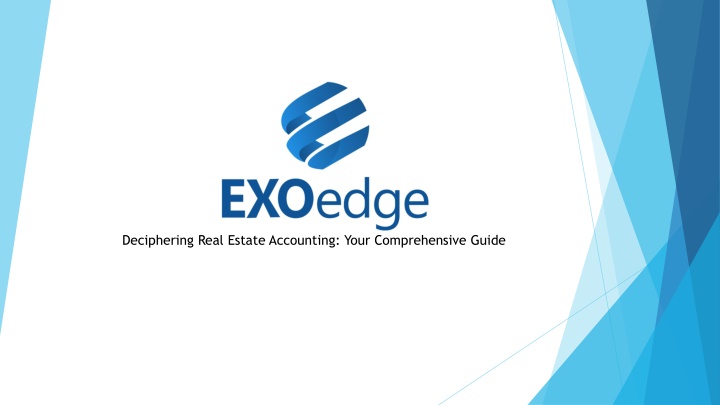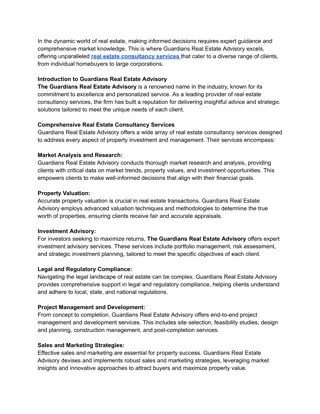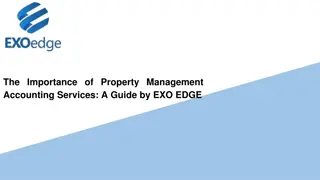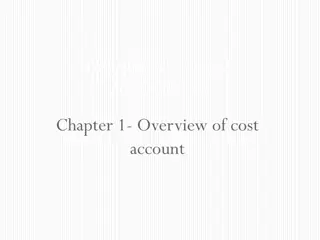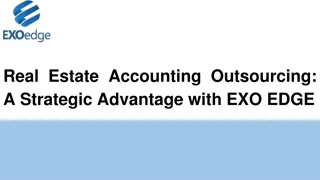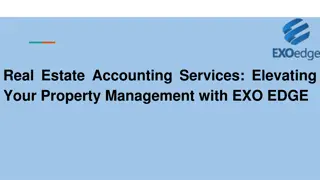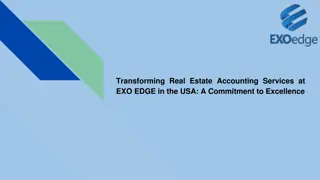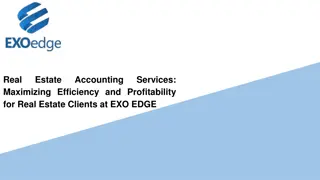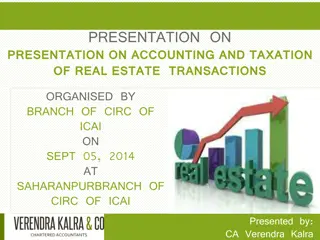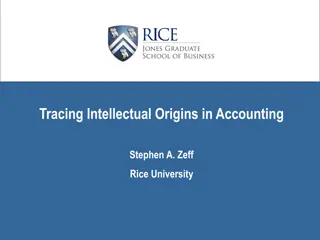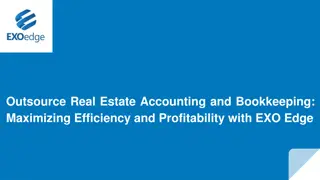Deciphering Real Estate Accounting, Your Comprehensive Guide
Real estate accounting is not just a set of numbers and calculations; it is the keystone of the real estate industry. This essential aspect covers all financial facets, from residential purchases to commercial developments. Generally, it is about ensuring financial health through tracking revenues and expenses while navigating the complex web of tax laws and regulations.
Download Presentation

Please find below an Image/Link to download the presentation.
The content on the website is provided AS IS for your information and personal use only. It may not be sold, licensed, or shared on other websites without obtaining consent from the author.If you encounter any issues during the download, it is possible that the publisher has removed the file from their server.
You are allowed to download the files provided on this website for personal or commercial use, subject to the condition that they are used lawfully. All files are the property of their respective owners.
The content on the website is provided AS IS for your information and personal use only. It may not be sold, licensed, or shared on other websites without obtaining consent from the author.
E N D
Presentation Transcript
Deciphering Real Estate Accounting: Your Comprehensive Guide
Real estate accounting is not just a set of numbers and calculations; it is the keystone of the real estate industry. This essential aspect covers all financial facets, from residential purchases to commercial developments. Generally, it is about ensuring financial health through tracking revenues and expenses while navigating the complex web of tax laws and regulations. This guide will explore the various accounting methods, key financial metrics, tax implications, and much more.
Types of Accounting Methods in Real Estate Two accounting methods are mainly used in real estate: the cash method and the accrual method. Cash Method of Accounting In the cash method, transactions are recorded when actual cash is exchanged. This means income is reported in the tax year it is received, and expenses are deducted in the tax year they are paid. This method is simple and is generally preferred by individuals and small businesses.
Accrual Method of Accounting The accrual method records income and expenses when they are earned or incurred, regardless of when the actual cash transaction happens. This method gives a more accurate picture of financial performance over a period. How to Choose the Right Method? The choice between cash and accrual accounting depends on numerous factors, including your business size, specific accounting needs, and compliance requirements. Most individuals and many small businesses use the cash method for its simplicity. However, larger businesses or those seeking a more detailed financial picture may opt for the accrual method.
Key Financial Metrics and Calculations Comprehending key financial metrics and calculations helps in evaluating property performance. This helps them to make investment decisions and assess financial health. Below is a list of essential financial metrics used in real estate: Net Operating Income (NOI): NOI is the income generated by a property after deducting all operational expenses. It is calculated by subtracting expenses like maintenance and management fees from the rental income. Gross Rent Multiplier (GRM): GRM is a quick way to estimate the value of an income-producing property. You calculate it by dividing the property s price by its gross annual rental income. Cash Flow: Cash flow refers to the net amount of cash that is being transferred into and out of a property. It is calculated by taking the NOI and subtracting any mortgage payments and other financing costs.
Managing Property Depreciation and Amortization An important aspect of real estate accounting is managing property depreciation and amortization of loans. This involves: Property Depreciation: Depreciation is the gradual deduction of the cost of a property over its estimated useful life. The IRS has set specific guidelines for how long different property types can be depreciated. Amortization of Loans: Amortization in real estate refers to paying off a loan (like a mortgage) over time in regular instalments. These payments are divided into interest and principal portions.
Real Estate Accounting Mastery As we wrap up our guide on real estate accounting, remember that the journey of property finances is a continuous learning experience. The knowledge you have gained today about accounting methods, key financial metrics, tax implications, and property depreciation forms the foundation for your financial success. But the path to mastering real estate finances does not end here; you must seek your own advice from a professional advisor in your area. A local accountancy firm experienced in supporting property owners will give you the advice required to be compliant as well as support your financial ambition.
